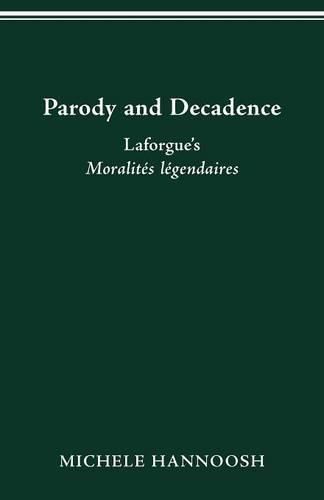Readings Newsletter
Become a Readings Member to make your shopping experience even easier.
Sign in or sign up for free!
You’re not far away from qualifying for FREE standard shipping within Australia
You’ve qualified for FREE standard shipping within Australia
The cart is loading…






This title is printed to order. This book may have been self-published. If so, we cannot guarantee the quality of the content. In the main most books will have gone through the editing process however some may not. We therefore suggest that you be aware of this before ordering this book. If in doubt check either the author or publisher’s details as we are unable to accept any returns unless they are faulty. Please contact us if you have any questions.
Laforgue’s collection of stories, the Moralites legendaires, freely modernizes established stories of literary tradition according to the stereotypical preoccupations of 1880s Decadence. In this first complete study of the Moralites in any language, Laforgue’s stories emerge as brilliant examples of parody in its most creative form, among the most original prose creations of the late nineteenth century. Laforgue is known to most English-speaking readers as an influence on T. S. Eliot. In France he is considered a major writer, alongside Symbolist writers such as Baudelaire, Rimbaud, and Mallarme. Laforgue’s stories fully exploit the creative possibilities of parody, and thus make a particularly illuminating contribution, resolving many long-standing theoretical questions. The stories provide a rich source for investigating the procedures of parody and for formulating a sufficiently general and flexible theory to account for the diversity of its form over time. Hannoosh examines the 1880s notion of Decadence with which Laforgue’s Moralites plays and attempts to revise the prevailing view of the movement to reflect the importance of parody therein. She provides close readings of the six stories: Hamlet, Le Miracle des Roses, Lohengrin, Salome, Persee et Andromede, and Pan et la Syrinx. Using an intertextual model of literary theory, Michele Hannoosh derives a theory of the genre overall and addresses the issues raised by metafictional theories of parody from the Russian Formalists onward. Michele Hannoosh is Assistant Professor of French and Comparative Literature at the University of California, Davis. She has written many articles on nineteenth-century French literature and art.
$9.00 standard shipping within Australia
FREE standard shipping within Australia for orders over $100.00
Express & International shipping calculated at checkout
This title is printed to order. This book may have been self-published. If so, we cannot guarantee the quality of the content. In the main most books will have gone through the editing process however some may not. We therefore suggest that you be aware of this before ordering this book. If in doubt check either the author or publisher’s details as we are unable to accept any returns unless they are faulty. Please contact us if you have any questions.
Laforgue’s collection of stories, the Moralites legendaires, freely modernizes established stories of literary tradition according to the stereotypical preoccupations of 1880s Decadence. In this first complete study of the Moralites in any language, Laforgue’s stories emerge as brilliant examples of parody in its most creative form, among the most original prose creations of the late nineteenth century. Laforgue is known to most English-speaking readers as an influence on T. S. Eliot. In France he is considered a major writer, alongside Symbolist writers such as Baudelaire, Rimbaud, and Mallarme. Laforgue’s stories fully exploit the creative possibilities of parody, and thus make a particularly illuminating contribution, resolving many long-standing theoretical questions. The stories provide a rich source for investigating the procedures of parody and for formulating a sufficiently general and flexible theory to account for the diversity of its form over time. Hannoosh examines the 1880s notion of Decadence with which Laforgue’s Moralites plays and attempts to revise the prevailing view of the movement to reflect the importance of parody therein. She provides close readings of the six stories: Hamlet, Le Miracle des Roses, Lohengrin, Salome, Persee et Andromede, and Pan et la Syrinx. Using an intertextual model of literary theory, Michele Hannoosh derives a theory of the genre overall and addresses the issues raised by metafictional theories of parody from the Russian Formalists onward. Michele Hannoosh is Assistant Professor of French and Comparative Literature at the University of California, Davis. She has written many articles on nineteenth-century French literature and art.